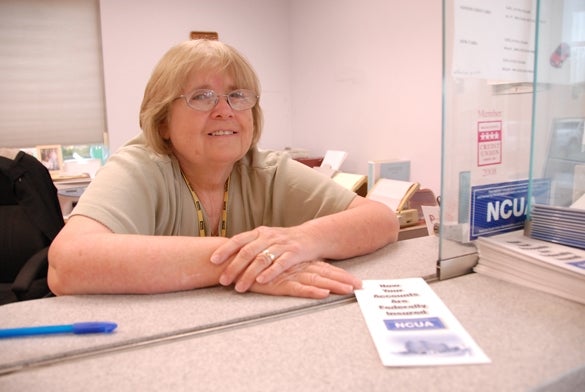For For some credit unions in Central Massachusetts, it appears that smaller is indeed better.
The merger mania seen in the local banking industry — three Central Mass. bank deals are currently pending — hasn’t moved into the credit union arena, at least not yet. But no matter the trends in the banking area, smaller credit unions here believe it’s likely they’ll remain small, independent financial institutions.
“The smaller you are the better off you are, that’s how we look at it here,” said Deborah Beando, manager and treasurer of the W-G Credit Union in Worcester. “We know our members. We work with them if they are having problems, and the majority of our members stick with us through thick and thin.”
Survival Strategies
That resilient spirit is found at many of the smaller credit unions, which have only a handful of employees and membership rolls in the hundreds.
For the area’s smallest credit union, W.H. Nichols Employees Federal Credit Union in Devens, its focus is on the few things it can do really well.
“We’re a really small credit union. I like to say we have two types of loans: personal and vehicle. Because we are that small, we can’t offer anything big like mortgages,” said Helen Desrochers, who has been the credit union’s treasurer and manager for 47 years.
It has assets of just over $1 million, with Desrochers as its one full-time employee and has about 320 members. It does not offer mortgages or online banking.
Its membership is limited to the employees of the former W.H. Nichols Co., which began in Waltham in the early 1900s, but moved to Devens. It was acquired in the 1980s by Parker Hannifin. Today, the company has 164 full- and part-time employees in Devens.
“The younger workers who come in are not that interested in joining – they want online banking and other services,” she said.
Membership Base
W-G Credit Union is substantially larger than W.H. Nichols, mostly because it has a broader base of employees to draw membership from. Anyone that works for Wyman-Gordon Co., Fallon Clinic, Fallon Community Health Plan, UMass Memorial Health Care and Charles River Labs, and their immediate family members, are eligible to join.
W-G has one location on Grafton Street and four full-time employees including Beando. Its assets are just shy of $10 million and it has about 2,700 members.
Thomas Clark, treasurer and CEO of the Leominster Employees Federal Credit Union, which has 2,100 members, said it’s service that keeps his organization running.
“All things considered, we keep moving forward as we have been doing. And that’s primarily because of the relationship we have with our members,” he said.
The credit union has one branch on Church Street, with five employees and a little over $11 million in assets.
“We’re usually more familiar with our members than larger institutions are. If they have problems with their accounts or they have questions, they know they can come in or call and get a response pretty much immediately,” Clark said.
“We like to say we’re the Cheers of credit unions, where everybody knows your name.”
While small, Leominster Employees Federal Credit Union isn’t sitting still.
In the past couple of years it entered the mortgage business by partnering with Allanach Mortgage Group of Nashua, N.H., which offers mortgages for more than 50 credits unions in New England and Florida.
Such partnerships make sense for survival according to Robert Kimmett, senior vice president of public relations and marketing for the Massachusetts Credit Union League of Marlborough.
“The small credit unions traditionally have done very well because they’re very well connected to their membership, but they face challenges because they don’t have the same resources and personnel that larger institutions do,” Kimmett said.
The trade group helps credit unions keep up-to-date on new regulations and legislation, as well as providing group buying for debit and credit card programs and other business services. The cooperative nature of credit unions leads them to work together for solutions, such as shared ATM networks and shared branching, he said. These solutions may make it easier for them to remain independent.
Shelter In A Storm
Clark acknowledged he can’t say that his institution will remain independent forever.
“In this day and age, it’s difficult to say that we’d never merge,” he said. “Regulations in our industry keep building up including requirements around privacy, red flags and other aspects of our business. We have to do all these things with a small staff and still provide all the services.”
But if the credit union did merge with another, it wouldn’t be because their financial condition necessitated it, he said. The credit union is doing well and he loves his job because it never gets dull.
For Desrochers, the future of the W.H. Nichols Credit Union lies with the corporate parent Parker Hannifin. “I told them my goal is 50 years and they’ve told me they’ll find to someone to run it after that,” she laughed.

